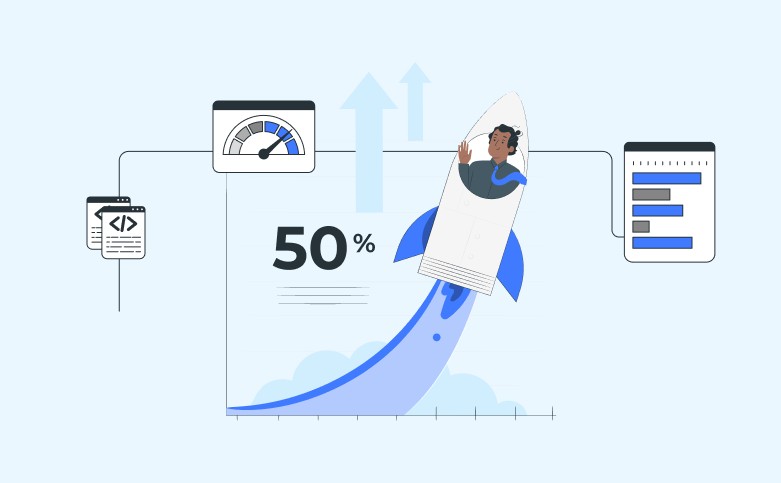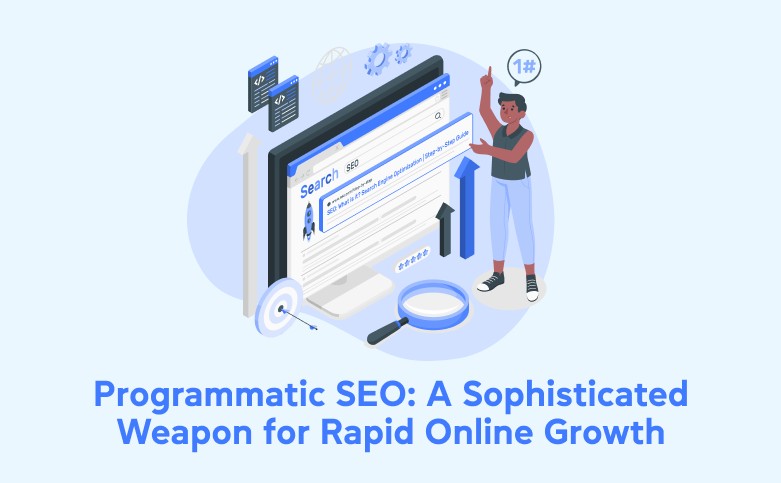Programmatic SEO: A Sophisticated Weapon for Rapid Online Growth
With the Christmas season just around the corner, are you looking to get more customers to your ecommerce store? Programmatic SEO could be just the tool you need to vastly increase your website traffic, particularly if you have a large ecommerce site with thousands of pages. Never heard of programmatic SEO? Here’s everything you need to know.
What is Programmatic SEO?

Simply put, programmatic SEO is SEO on steroids. It uses technology to optimise your website’s search engine performance by automatically optimising content at scale, without the need for continuous manual intervention.
You can think of programmatic SEO like having a digital marketing assistant who never sleeps, working tirelessly to improve your online visibility and drive organic traffic. It’s a tech-enabled strategy that uses algorithms, data analysis, and machine learning to constantly optimise your web pages.
How Does Programmatic SEO Work?
Now, you might be wondering, “How on earth does this wizardry work?” Well, let’s try to understand it with the help of a simple example:
Imagine you have a huge library with thousands of books, but no proper catalogue or organisation. If someone asks for a specific book, it would take ages to find it. Now, let’s say you have a robot that can quickly organise all the books, label them, and even suggest which books to acquire next based on the visitors’ preferences. This robot is doing “programmatic library management”.
Similarly, for a large website, programmatic SEO robots make it easy for search engines to find content optimised for the user’s query in real time.
Typically, programmatic SEO software performs the following jobs:
- Content Creation: Instead of manually writing or updating thousands of pages, programmatic SEO can automatically generate or adjust content based on data insights, like user behaviour or keyword trends.
- Technical Optimisation: Let’s say there are thousands of pages with broken links. Instead of checking each page manually, a programmatic approach would scan the whole site and fix the issues automatically.
- Keyword Research: Instead of doing keyword research manually for each page, programmatic tools can analyse vast amounts of data to find keyword opportunities and then optimise content accordingly.
- Reporting & Insights: Instead of manually compiling reports, the programmatic approach can provide real-time insights and updates about site performance.
- Scaling: Programmatic SEO shines especially for large sites, like ecommerce sites with thousands of product pages. It can be tough to manually optimise each page, but with programmatic SEO, tasks can be automated and scaled.
Is Programmatic SEO Suitable for Your Business?

Programmatic SEO is particularly beneficial for large websites with thousands or even millions of pages because it can automate and streamline processes that would otherwise be tedious and time-consuming. However, the relevance of programmatic SEO for small businesses depends on the specific needs and challenges of that business.
For Small Businesses
- Limited Necessity: If a small business has a website with only a handful of pages, the advantages of programmatic SEO may be limited. The primary benefits come from automating large-scale tasks, which may not be relevant for smaller sites.
- Budget Constraints: Programmatic SEO tools and solutions can be expensive. A small business might find better ROI by investing in traditional SEO methods or other forms of online marketing.
- Flexibility: Small businesses often have the advantage of being nimble. They can quickly adjust and optimise their website content manually, which might make automation less critical.
Best Suited For
- E-commerce Sites: Websites with a vast number of product listings can benefit immensely. For example, they might auto-generate meta tags or descriptions for products based on certain data attributes.
- Directories or Listing Sites: Websites like real estate listings, job boards, or any site with constantly changing or updating lists can utilise programmatic SEO to handle these dynamic pages.
- News or Media Outlets: These sites can use programmatic solutions to quickly optimise a large number of articles published daily.
- Travel & Hospitality: Websites that list various accommodations, flight details, or travel packages can use programmatic SEO to manage and optimise content efficiently.
- Sites Targeting Many Regions: Websites that have multi-language versions or cater to various regions might automate content localisation and optimisation processes.
For most small businesses with straightforward websites, traditional SEO methods are usually sufficient.
How to Implement Programmatic SEO
Here’s a simple guide for implementing programmatic SEO in your business.
1. Research and Choose the Right Tool
Start by researching programmatic SEO tools that align with your needs and budget. Look for tools that are easy to use and offer features like keyword research, real-time optimisation, content generation, and comprehensive reporting.
Some of the latest programmatic SEO tools include:
- SEOmatic:A comprehensive programmatic SEO platform that offers a wide range of features, including content generation, keyword research, and link building.
- PageFactory: Specialises in generating and optimising dynamic pages at scale.
- Whalesync: A data synchronisation tool that can be used to connect your programmatic SEO tools to your website CMS.
- SEOBrrr: An AI-powered programmatic SEO tool that can help you to automate and optimise your SEO campaigns.
Additionally, general SEO tools like Ahrefs and Semrush also offer programmatic SEO features.
3. Setup Programmatic SEO
You’ll need to invest time in setting up the chosen programmatic SEO tool. This may involve integrating it with your website, configuring settings, and inputting relevant data. It’s here that a digital marketing agency can help you tremendously.
4. Content Review
If your tool generates content automatically, review and edit it to ensure it aligns with your brand’s voice and quality standards. You can hire a human editor or work with an agency that provides content review services.
5. Monitor and Adjust
Continuously monitor the performance of your programmatic SEO strategy. Pay attention to the data and reports provided by the tool, and make adjustments as needed to improve results.
6. Stay Informed
Keep yourself updated on SEO trends and changes in search engine algorithms. While programmatic SEO tools can handle much of the work, staying informed will help you make strategic decisions.
Looking Forward
Programmatic SEO is a powerful tool that can help businesses to improve their website’s ranking in SERPs, increase traffic to their website, and generate more leads and sales. If you are looking for a way to scale your SEO efforts and improve your website’s performance, programmatic SEO is a great option to consider. Contact us to find out how we can help you set up and drive results using programmatic SEO,








